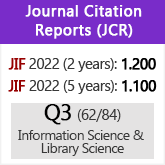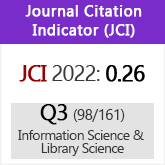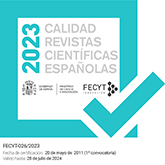The promotion of reading: a critical analysis of research articles
DOI:
https://doi.org/10.3989/redc.2017.4.1450Keywords:
Reading Promotion, Reading habits, Recreational Reading, Emergent Literacy, Reading Programs, Libraries, Public virtual epitextAbstract
Reading is an increasingly worrisome issue. Low rates of reading, reading comprehension results of students, and the challenge of the new digital context have provoked an important debate around reading and how to promote it. This paper analyzes the research published from 2000 to 2015 in international journals indexed in Scopus and WoS, and highlights the need to look at this matter from an interdisciplinary and empirical perspective. The final aim is to establish the basis for appropriate action in order to consolidate stable reading habits, especially among children and youth. The analysis concludes that much of what is currently on offer for promoting reading is basically an attempt to make books and reading appear attractive to young readers, although research on the results of such initiatives is still scarce.
Downloads
References
Álvarez-Álvarez, C.; Pascual-Díaz, J. (2013). Estudio de caso sobre la formación de lectores críticos mediante textos literarios en la Educación Primaria. Ocnos, 10, 27-53. Recuperado de http://www.revista.uclm.es/index.php/ocnos/article/view/291
Álvarez-Álvarez, C.; Pascual-Díaz, J. (2014). Aportaciones de un club de lectura escolar a la lectura por placer. El profesional de la información, 23 (6), 625-631. https://doi.org/10.3145/epi.2014.nov.10
Álvarez-Zapata, D.; Giraldo-Girado, Y.N.; Ocampo-Molina, N.Y.; Guerra-Sierra, L. M.; Melgar-Estrada, L.; Gómez Vargas, M. (2009). Representaciones bibliotecarias sobre la biblioteca pública, la lectura, el lector, la promoción y la animación a la lectura en Medellín, Colombia. Investigación bibliotecológica, 23 (49), 197-240.
Arias-Arenas, C. (2013). Los cuentos en el programa "Libro al Viento". Ocnos, 10, 131-146. Recuperado de http:// www.revista.uclm.es/index.php/ocnos/article/view/292
Baró, M.; Ma-à, T.; Barrios, M.; Baena, J. (2012). Promoción de la lectura en las bibliotecas públicas de Catalu-a: evaluación y resultados. El profesional de la información, 21 (3), 277-281. https://doi.org/10.3145/epi.2012.may.08
Behrmann, L.; Souvignier, E. (2015). Effects of fit between teachers' instructional beliefs and didactical principles of reading programs. European Journal of Psychology of Education, 30 (3), 295–312. https://doi.org/10.1007/s10212-014-0241-6
Butz, A. M.; Crocetti, M.; Thompson, R. E.; Lipkin, P.H. (2009). Promoting Reading in children: Do Reading practices differ in children with development problems? Clinical Pediatrics, 48 (3), 275-283. https://doi.org/10.1177/0009922808327054 PMid:19023108
Conn, V.S.; Isaramalai, S. A.; Rath, S.; Jantarakupt, P.; Wadhawan, R.; Dash Y. (2003). Beyond MEDLINE for literature searches. Journal of Nursering Scholarship, 35 (2), 177-182. https://doi.org/10.1111/j.1547-5069.2003.00177.x
Costa, A. F.; Pegado, E.; Ávila, P.; Coelho, A. (2013). Mixed-methods evaluation in complex programmes: The national reading plan in Portugal. Evaluation and Program Planning, 39, 1-9. https://doi.org/10.1016/j.evalprogplan.2013.02.001 PMid:23474434
Costa, A. F.; Pegado, E.; Ávila, P., Coelho, A. (2015). Evaluating the Portuguese National Reading Plan: teachers' perceptions on the impact in school. Educational Research for Policy and Practice, 14 (2), 119–138. https://doi.org/10.1007/s10671-014-9171-y
De Naeghel, J.; Van Keer, H. (2013). The relation of student and class-level characteristics to primary school students' autonomous reading motivation: a multi-level approach. Journal of Research in Reading, 36 (14), 351–370. https://doi.org/10.1111/jrir.12000
Dibam (2012). Modelo de evaluación para identificar el aporte de las bibliotecas públicas en el desarrollo de comunidades. Cerlalc; Bogotá. http://ir.uv.es/rr1F0ng [18 de junio de 2016].
Doiron, R.; Asselin, M. (2011). Promoting a culture for reading in a diverse world. IFLA Journal, 37 (2), pp. 109- 117. https://doi.org/10.1177/0340035211409847
Elsayed, A. M. (2010). Arab online book clubs: A survey. Library Associations and Institutions, 36 (3), 235–250. https://doi.org/10.1177/0340035210378864
Elliott, J. (2009). Barriers to extracurricular reading promotion in academic libraries. Reference and User Services Quarterly, 48 (4), 340-346. https://doi.org/10.5860/rusq.48n4.340
Escardó i Bas, M. (2012). Cuidando el proceso lector desde las bibliotecas. Ibersid, 6, 53-64.
Farmer, L.; Stricevic, I. (2011). El uso de la investigación para promover la alfabetización y la lectura en las bibliotecas: guía para los bibliotecarios. IFLA; La Haya. http://www.ifla.org/files/assets/hq/publications/professional-report/126.pdf [2 de enero de 2015].
Fereday, J.; Muir-Cochrane, E. (2006). Demonstrating rigor using thematic analysis: A hybrid approach of inductive and deductive coding and theme development. International Journal of Qualitative Methods, 5 (1). https://doi.org/10.1177/160940690600500107
García-Rodríguez, A.; Gómez-Díaz, R. (2016). Lectura digital infantil. Dispositivos, aplicaciones y contenidos. UOC; Barcelona.
Gilbert, J.; Fister, B. (2011). Reading, Risk and Reality: College Students and Reading for Pleasure. College & Research Libraries, 72 (5), 474-495. https://doi.org/10.5860/crl-148
Gladwin, R.M.; Goulding, A. (2012). Recreational Reading in Universities Libraries in The United Kingdom. New Review of Academic Librariannship, 18 (2), 140-164. https://doi.org/10.1080/13614533.2012.709213
Gómez-Díaz, R.; García-Rodríguez, A.; Cordón-García, J. A.; Alonso-Arévalo, J. (2016). Leyendo entre pantallas. Trea; Gijón.
Grammont Machado de Araújo, M. J. (2013). Disponibilidade, acceso e apropiaçao da leitura no contexto do programa "Literatura em mina casa". Educaçao em Revista, 29 (2), 225-252. https://doi.org/10.1590/S0102-46982013000200010
Granda Orive, J.I.; García Río, F.; Callol Sánchez, L. (2003). Importancia de las palabras clave en las búsquedas bibliográficas. Revista Española de Salud Pública, 77 (3), 765-767. http://www.redalyc.org/ pdf/170/17077610.pdf https://doi.org/10.1590/S1135-57272003000600010
Guí-ez, M.; Martínez, E. (2015). Medición lectora y primera infancia: construcción de sentidos subjetivos e identitarios. Estudio de caso en ni-os de 3º y 4º de educación básica del Colegio Adventista de Valdivia. Estudios Pedagógicos, 41 (nº especial), 115-134.
Hernández Sampieri, R.; Fernández-Collado, C.; Baptista Lucio, P. (2010). Metodología de la investigación. Mcgraw-Hill; México.
High, P.C. (2014). Literacy Promotion: An Essential Component of Primary Care Pediatric Practice. Pediatrics, 134 (2). PMid:24962987
Huysmans, F.; Kleijnen, E.; Broekhof, K.; Dalem, T. Van. (2013). The Library at School: effects on reading attitude and reading frequency. Performance Measurement and Metrics, 14 (2), 142-156. https://doi.org/10.1108/PMM-05-2013-0013
Kavi, R. K.; Tackie, S. N.; Bugyei, K. (2015). Reading for pleasure among junior high school students: case study of the Saint Andrew`s Anglican Complex Junior High School, Sekondi. Library Philosophy and Practice (e-journal), Paper1234. http://digitalcommons.unl. edu/libphilprac/1234 [13 de junio de 2015].
Laurenson, P.; McDermott, K.; Sadleir, K. (2015). From national policy to classroom practice: Promoting reading for pleasure in post-primary English classrooms. English in Education, 49 (1), 5-24. https://doi.org/10.1111/eie.12054
Lluch, G. (2014). Jóvenes y adolescentes hablan de lectura en la red. Ocnos, 11, 7-20. https://doi.org/10.18239/ocnos_2014.11.01
Lluch, G.; Zayas, F. (2015). Leer en el centro escolar. El plan de lectura. Editorial Octaedro; Barcelona.
Lluch, G.; Tabernero-Sala, R.; Calvo-Valios, V. (2015). Epitextos virtuales públicos como herramientas para la difusión del libro. El profesional de la información, 24 (6), 797-804. https://doi.org/10.3145/epi.2015.nov.11
Lu, K.; Kipp, M.E.I. (2014). Understanding the Retrieval Effectiveness of Collaborative Tags and Author Keywords in Different Retrieval Environments: An Experimental Study on Medical Collections. Journal of the Association for Information Science and Technology, 65 (3), 483- 500. https://doi.org/10.1002/asi.22985
Manso-Rodríguez, R.A. (2012). Bibliotecas, fomento de la lectura y redes sociales: convirtamos amigos en lectores. El profesional de la información, 21 (4), 401-405. https://doi.org/10.3145/epi.2012.jul.12
Manso-Rodríguez, R.A. (2015). ¡Leer, comentar, compartir! El fomento de la lectura y las tecnologías sociales. TransInformação, 27 (1), 9-19. https://doi.org/10.1590/0103-37862015000100001
Marlasca, B.; Sánchez-García, S. (2015). Los clubes de lectura: un diálogo entre lectores. En: S. Sánchez-García; S. Yubero (coord.). Las bibliotecas en la formación del hábito lector. Universidad de Castilla-La Mancha; Cuenca.
Martín-Barbero, J.; Lluch, G. (2011). Lectura, escritura y desarrollo en la sociedad de la información. Cerlalc y Unesco; Bogotá. PMid:21890872 PMCid:PMC3240760
Meho, L.I.; Yang, K. (2007). Impact of data sources on citation counts and rankings of LIS faculty: Web of Science versus Scopus and Google Scholar. Journal of the American Society for Information Science and Technology, 58 (13), 2105-2125. https://doi.org/10.1002/asi.20677
Mieles Barrera, M. D.; Tonon, G.; Alvarado Salgado, S. V. (2012). Investigación cualitativa: el análisis temático para el tratamiento de la información desde el enfoque de la fenomenología social. Universitas Humanística, 74, 195-225. http://www.scielo.org.co/pdf/unih/n74/ n74a10.pdf [14 de febrero de 2016].
Monar van Vliet, M. (2012). Promoción de la lectura en el marco educativo. Ocnos, 8, 67-74. https://doi.org/10.18239/ocnos_2012.08.06
Ogg, J. A.; Sundman-Wheat, A. N.; Bateman, L. P. (2012). A Primary Approach to Reading: Review of Early Literacy Interventions Implemented in Pediatric Settings. Journal of Applied School Psychology, 28 (2), 111-132. https://doi.org/10.1080/15377903.2012.669741
PISA (2010). La lectura en PISA 2009. Marcos y pruebas de la evaluación. Ministerio de Educación; Madrid http://ir.uv.es/ZI5fpfG [18 enero de 2016].
Ramos, M.; Vila, I. (2015). The role of public libraries in promoting reading within the family. International Federation of Library Associations and Institutions, 41 (4), 364–369. https://doi.org/10.1177/0340035215596351
Sauperl, A. (2012). Pinning down a novel: characteristics of literary works as perceived by readers. Library Review, 61 (4), 286-303. https://doi.org/10.1108/00242531211267581
Sloat, E.A.; Letourneau, N.L.; Joschko, J.R.; Schryer, E.A.; Colpitts, J.E. (2015). Parent-mediated Reading Interventions with Children up to Four Years Old: a Systematic Review. Issues in Comprehensive Pediatric Nursing, 38 (1), 39-56. https://doi.org/10.3109/01460862.2014.983279 PMid:25533602
Train, B.; Elkin, J. (2001). Measuring the unmeasurable: reader development and its impact on perfomance measurement in the public library sector. Library Review, 50 (6), pp. 295-304. https://doi.org/10.1108/EUM0000000005598
Tuckett, A. G. (2005). Applying thematic analysis theory to practice: a researcher's experience. Contemporary Nurse, 19 (1-2), 75-87. https://doi.org/10.5172/conu.19.1-2.75
Vanobbergen, B.; Daems, M.; Van Tilburg, S. (2009). Bookbabies, their parents and the library: an evaluation of a Flemish reading programme in families with young children. Educational Review, 61 (3), 277-287. https://doi.org/10.1080/00131910903045922
Yubero, S.; Larra-aga, E. (2015). Lectura y universidad: hábitos lectores de los estudiantes universitarios de España y Portugal. El profesional de la información, 24 (6), 717-723. https://doi.org/10.3145/epi.2015.nov.03
Yubero, S.; Sánchez-García, S. (2015). Las guías de lectura en el espacio de las bibliotecas. En: S. Sánchez- García y S. Yubero (coord.), Las bibliotecas en la formación del hábito lector. Universidad de Castilla-La Mancha; Cuenca.
Published
How to Cite
Issue
Section
License
Copyright (c) 2017 Consejo Superior de Investigaciones Científicas (CSIC)

This work is licensed under a Creative Commons Attribution 4.0 International License.
© CSIC. Manuscripts published in both the printed and online versions of this Journal are the property of Consejo Superior de Investigaciones Científicas, and quoting this source is a requirement for any partial or full reproduction.All contents of this electronic edition, except where otherwise noted, are distributed under a “Creative Commons Attribution 4.0 International” (CC BY 4.0) License. You may read here the basic information and the legal text of the license. The indication of the CC BY 4.0 License must be expressly stated in this way when necessary.
Self-archiving in repositories, personal webpages or similar, of any version other than the published by the Editor, is not allowed.

















